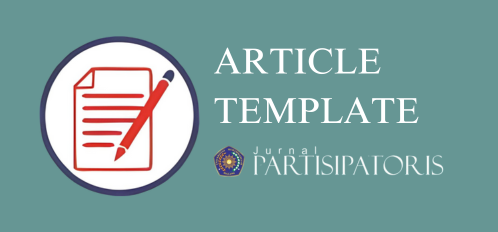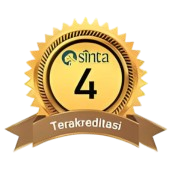COMMUNITY SOCIAL ACTION ON PUNDHEN LO SARI CREATIVE PARK IN MAOSPATI VILLAGE MAGETAN REGENCY
DOI:
https://doi.org/10.22219/jp.v5i1.25657Abstract
The development of religious tourism does not have to be related to mystical or sacred things. But it can be developed into a creative park with open facilities for children to play. As happened in the Maospati Magetan Village, it has succeeded in developing a village pundhen which was originally a wingit (sacred) place which was converted into an open (profane) park, named Park Creation Lo Sari Maospati. However, this creative park is still used as an annual village clean location by the community. The theory used by the researcher as a research reference in this study is the theory of action from Max Weber, because the researcher sees the phenomenon of the development of the Lo Sari creation park in an effort to empower social and spiritual economy, which is very relevant to the theory of action from Max Weber. This research approach uses a qualitative approach with a Schutz phenomenological perspective. The results of the study indicate that there are at least three groups of people who can be analyzed for their social actions. First, community groups with instrumental rational action, such as village officials and Pokadrwis. They assume that the development of Lo Sari's Pundhen into a creative park will increase the income of local residents. The second group is value rational action, almost the same as instrumental rational action group, except that this group prioritizes religious values. While the third is a traditional action, where the actors who carry out activities at Pundhen Lo Sari are those who follow their previous parents.
Downloads
References
Afrizal. 2016. Metode Penelitian Kualitatif: Sebuah Upaya Mendukung Penggunaan Penelitian Kualitatif Dalam Berbagai Disiplin Ilmu. Jakarta: PT. Raja Grafindo Persada
Creswell, W John, 2014. Research Design: Qualitative, Quantitative, & Mixed Methods Approaces. Fourth Edition. Sage Publications, Inc.
Endraswara, Suwardi, 2010. Etika Hidup Orang Jawa,Yogyakarta: Narasi
Jacky, M. 2015. Sosiologi. Konsep, Teori dan Metode. Jakarta: Mitra Wacana Media
Martono, N. 2015. Metodologi Penelitian Sosial: Konsep-konsep Kunci. Jakarta: Raja Grafindo Persada
Moleong, L.J. 2013. Metodologi Penelitian Kualitatif. Ed. Revisi. Bandung: Remaja Rosdakarya
Mulyana, D. 2013. Metodologi Penelitian Kualitatif. Bandung: Remaja Rosdakarya
Murdiyastomo, H.Y.A. 2017. Budaya Lokasl dalam Perkembangan Pariwisata di Yogyakarta. Yogyakarta: Prodi Ilmu Sejarah FIS UNY
Pulungan, J.S. 2017. Internalisasi dan Aktualisasi Nilai-nilai Keislaman dalam Tradisi dan Budaya Masyarakat Indonesia. Humanika: Vol. 2 No. 1
Ritzer, George, dan Douglas J, Goodman. 2008. “Teori Sosiologi: Dari Teori Sosiologi Klasik Sampai Perkembangan Mutakhir Teori Sosial Postmodern.” Edisi. Terbaru. Cetakan 1. Terjemahan Nurhadi. Bantul: Kreasi Wacana.
Sugiyono. 2012. Metode Penelitian Kuantitatif, Kualitatif, dan Risearch and Development. Bandung: Alfabeta
Supraja, Muhammad. 2012. “Alfred Schutz: Rekonstruksi Teori Tindakan Max Weber.” Jurnal Pemikiran Sosiologi 1(2):81-90
Titisari, Ema Yunita. 2018. Sumber Air dalam Ruang Budaya Masyarakat Desa Toyomerto Singosari, Malang. Ruang: Jurnal Lingkungan Binaan, 5(1), 77-91
Downloads
Published
How to Cite
Issue
Section
License

This work is licensed under a Creative Commons Attribution-ShareAlike 4.0 International License.
Authors who publish with Jurnal Partisipatoris agree to the following terms:
- For all articles published in the Jurnal partisipatoris, copyright is retained by the authors. Authors give permission to the publisher to announce the work with conditions. When the manuscript is accepted for publication, the authors agree to the automatic transfer of non-exclusive publishing rights to the publisher.
- Authors retain copyright and grant the journal right of first publication with the work simultaneously licensed under a Creative Commons Attribution-ShareAlike 4.0 International License that allows others to share the work with an acknowledgment of the work's authorship and initial publication in this journal.
- Authors are able to enter into separate, additional contractual arrangements for the non-exclusive distribution of the journal's published version of the work (e.g., post it to an institutional repository or publish it in a book), with an acknowledgment of its initial publication in this journal.
- Authors are permitted and encouraged to post their work online (e.g., in institutional repositories or on their website) prior to and during the submission process, as it can lead to productive exchanges, as well as earlier and greater citation of published work (See The Effect of Open Access).











